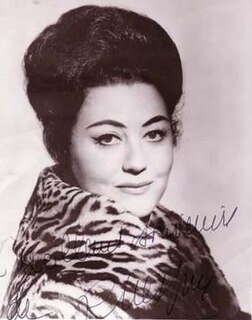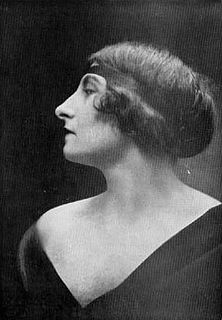Related Research Articles

Dialogues des Carmélites is an opera in three acts, divided into twelve scenes with linking orchestral interludes, with music and libretto by Francis Poulenc, completed in 1956. The composer's second opera, Poulenc wrote the libretto after the work of the same name by Georges Bernanos. The opera tells a fictionalised version of the story of the Martyrs of Compiègne, Carmelite nuns who, in 1794 during the closing days of the Reign of Terror during the French Revolution, were guillotined in Paris for refusing to renounce their vocation.

Régine Crespin was a French singer who had a major international career in opera and on the concert stage between 1950 and 1989. She started her career singing roles in the dramatic soprano and spinto soprano repertoire, drawing particular acclaim singing Wagner and Strauss heroines. She went on to sing a wider repertoire that embraced Italian, French, German, and Russian opera from a variety of musical periods. In the early 1970s Crespin began experiencing vocal difficulties for the first time and ultimately began performing roles from the mezzo-soprano repertoire. Throughout her career she was widely admired for the elegance, warmth and subtlety of her singing, especially in the French and German operatic repertories.

Mady Mesplé is a French opera singer. She is considered the leading high coloratura soprano of her generation in France, and sometimes heralded as the successor to Mado Robin.

André Cluytens was a Belgian-born French conductor who was active in the concert hall, opera house and recording studio. His repertoire extended from Viennese classics through French composers to 20th century works. Although much of his career was spent in France, he was the first French conductor at Bayreuth in 1955; he also conducted the Ring and Parsifal at La Scala.
Denise Duval was a French soprano, best known for her performances in the works of Francis Poulenc on stage and in recital. During an international career, Duval created the roles of Thérèse in Les mamelles de Tirésias, Elle in La voix humaine, and excelled in the role of Blanche de la Force in Dialogues of the Carmelites, leaving recordings of these and several other of her main roles.

Denise Scharley was a French contralto who made her debut in 1942, singing Pelléas et Mélisande at the Opéra-Comique.
Janine Micheau was a French operatic soprano, one of the leading sopranos of her era in France, particularly associated with lyric soprano and coloratura soprano repertory.
Renée Doria is a French opera singer, one of the leading lyric coloratura sopranos of her era in France.
Pierre Dervaux was a French operatic conductor, composer, and pedagogue. At the Conservatoire de Paris, he studied counterpoint and harmony with Marcel Samuel-Rousseau and Jean and Noël Gallon, as well as piano with Isidor Philipp, Armand Ferté, and Yves Nat. He also served as principal conductor of the Opéra-Comique (1947–53), and the Opéra de Paris (1956–72). In this capacity he directed the French première of Poulenc’s Dialogues des Carmélites. He was also Vice-President of the Concerts Pasdeloup (1949–55), President and Chief conductor of the Concerts Colonne (1958–92), Musical Director of the Orchestre des Pays de Loire (1971–79) as well as holding similar posts at the Quebec Symphony Orchestra (1968–75), where he collaborated with concertmaster Hidetaro Suzuki, and the Nice Philharmonic (1979–82).
Jacqueline Brumaire was a French operatic soprano and later teacher.
Irène Joachim was a French soprano, and later a vocal teacher.
Cécile Simonnet was a French operatic soprano.
Vina Bovy born Ghent 22 May 1900, died in the same city 16 May 1983 was a Belgian operatic soprano.

Marguerite Bériza was a French opera singer who had an active international career during the first half of the 20th century. She began her career as a mezzo-soprano at the Opéra-Comique in 1900; ultimately transitioning into the leading soprano repertoire at that theatre in 1912. She performed extensively in the United States from 1914–1917 and was also heard as a guest artist at theatres in the French provinces, Monaco, Portugal, and Switzerland during her career. In 1924 she founded her own opera company in Paris with whom she actively performed up until 1930.
The Devriès family were operatic singers over three generations, of Dutch descent. They were mainly active in France, Belgium and the USA in the second half of the 19th and the early 20th centuries.

Jacques Hivert (1919–1987) was a French 20th-century martin baritone.
Suzanne Sarroca is a 20th-century French operatic soprano.
Xavier Depraz, néXavier Marcel Delaruelle was a French opera singer and actor.
Suzanne Catherine Cesbron-Viseur was a French soprano and singing teacher.

Suzanne Berchut, called Suzanne Balguerie was a French operatic singer. Admired by Fauré, Dukas, Poulenc, and Messiaen, she was one of the greatest sopranos of the interwar period.